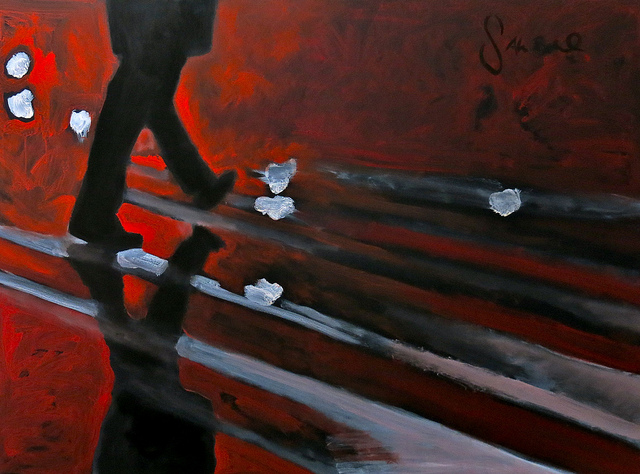Recently I wrote an article titled Why I Disappeared—an Open Letter to the Girls I Never Texted Back.
I decided to write the letter as a first person account, despite never actually performing the disappearing acts I described.
While I may, at times, have made some bad decisions and behaved in ways that I am not proud of, direct inspiration for the letter didn’t come from personal experience, but from conversations I’ve had with dozens of young men and women over the last three years.
Before you write in telling me how convenient it is that after a flurry of angry comments it suddenly “wasn’t me,” you should know that I spent most of my 20’s in a long-term relationship. So, as hard as it is to believe, I really wasn’t that guy.
But that’s completely beside the point.
The point is this: It’s hard to be completely open and honest, to speak a truth that might hurt someone, regardless of whether it’s face to face, via text or in an open letter posted online.
In the letter, I chose to personally represent the collective male voice of an issue that seems to be spiraling out of control. Not many men are willing to express themselves. They aren’t even willing to risk saying the wrong thing in fear of causing hurt and eliciting an angry response. Ironically, this is exactly what happened when I wrote an expressive, albeit fictional, article.
I posted the letter overnight, expecting a large, mixed response. By the time I woke the next morning, my inbox was full.
Almost half of the messages went along the lines of the following:
How dare you apologize now?
You deserve to be racked with guilt for the rest of your life!
I hope you end up miserable and lonely.
You are a weak piece of sh*t…
…and a few more that probably wouldn’t make it past even our most liberal censors.
It may come as a surprise, but I agree with most of what was said. I agree that some damage cannot be undone. I agree that most of these men were fully aware of what they were doing.
They were selfish. Their behaviors were weak and immoral.
For the women they hurt it is too late to apologize.
On the same token, I can completely empathize with how these young men felt.
Growing up, I attended an all-boys school, a place where real conversations were taboo. Showing any signs of vulnerability was considered weak, and as such, was actively discouraged with phrases like “man-up,” “don’t be soft,” “grow a pair,” and the ever popular “harden the f*ck up.”
I was taught that it was always better to say less, than risk saying the wrong thing. I was taught to be strong, control my emotions and be a real man.
My father would often tell me, “cowboys don’t cry.” In fairness to my father, he never used the phrase in direct reference to how I should deal with emotions. However, I knew that if I ever asked how he was feeling, if things were bad, he’d always say the same thing—“ah, you know, cowboys, don’t cry.”
So, just like the men in the letter, I too was terrified of having real conversations. I avoided them for as long as possible, and even when I did have to have one, I held myself back and presented a safe version of my emotions. I may not have disappeared, but I’ve definitely made my fair share of weak excuses not to see girls anymore.
And while this does not excuse the behavior of the men represented in the letter, it does at least give some extra context to the internal pressure experienced by young men. Most of their adolescence revolves around trying to appear tough—then suddenly they are told to flick a switch and express feelings they have spent years learning to suppress.
How can we expect young men to have real conversations when they are raised in a culture that discourages openness?
And while I don’t condone the behavior described in the letter, as always, there are two sides to every story. There are two sets of emotions, two sets of pasts, two sets of strengths, weaknesses, desires, motives and fears.
This was the sentiment that filled the other half of my inbox—a healthy dose of understanding, empathy and compassion—a myriad of men and women who could relate to the letter.
One of the most powerful emails came from a young man who had once been that guy. He told me that he could relate to the fear of not knowing how to have that awkward conversation. He acknowledged that he’d known it was wrong to disappear. He also acknowledged that he believed he was simply doing the best he could with what he had.
At the time, what he had was a decade long habit of withdrawing from emotional situations—an overwhelming fear of what would happen if he opened himself up. He knew what he should do, but he didn’t feel like he had the tools necessary to do it.
The article was not written to justify bad behaviours or purge guilt. There is no question that disappearing is an awful, selfish thing to do. The article was merely an attempt to spark a discussion that clearly needs to be had.
How can we begin a real conversation about the real problem at hand? How can we holster our swords and start to talk about what we can do to fix the problem—about how we can support young men by teaching them the value of being open—about how fear can only be overcome by an empathetic, compassionate approach.
A few decades ago we experienced the first wave of the feminist revolution. And while there is still a long way to go to overcome centuries of female oppression, we are gradually starting to see some major cultural shifts.
Maybe it’s time for a young-male revolution—for a large scale cultural shift that promotes open, emotive dialogue among young men.
I see this as our best shot at breaking the cycle of disconnection. How we do this, I’m not entirely sure.
But, as is always the case, all great changes begin with an open, honest, real conversation.
Relephant:
Why Men Withdraw Emotionally.
Author: Garrick Transell
Editor: Renée Picard
Image: torbakhopper/Flickr









Read 19 comments and reply